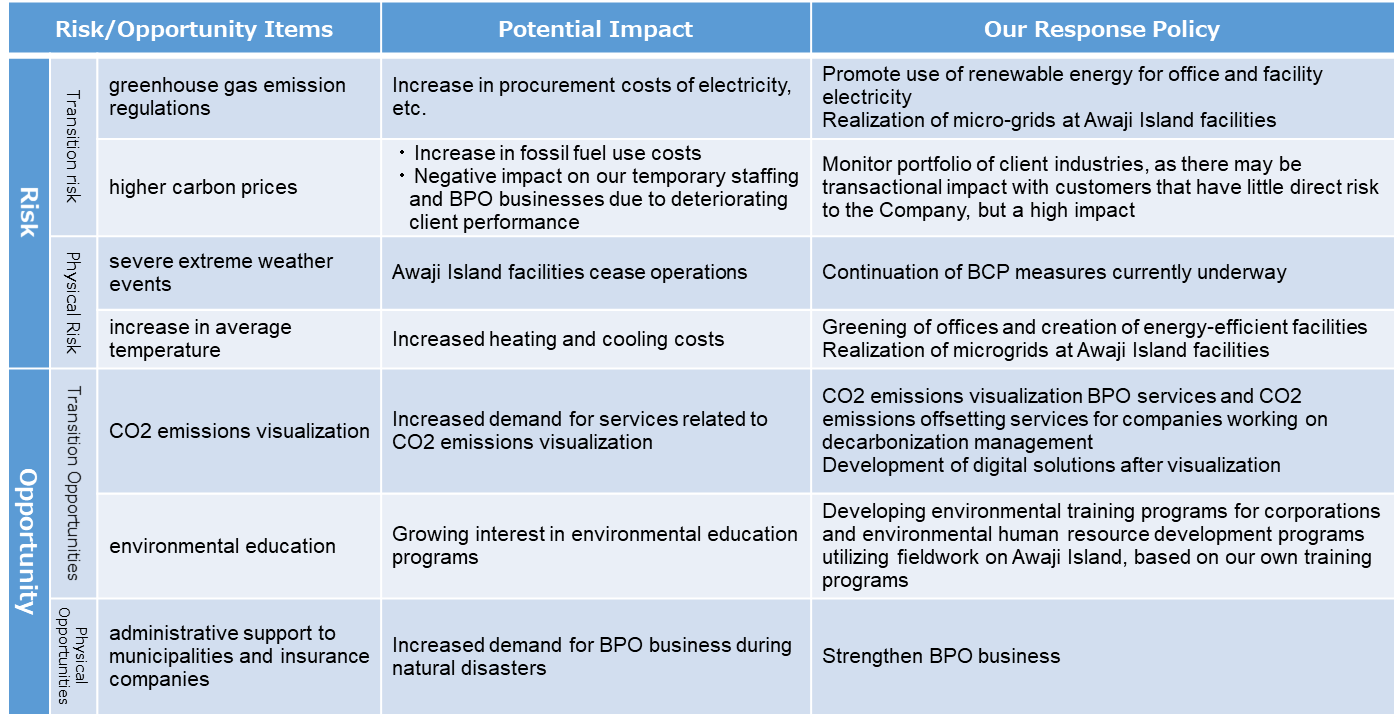Major efforts to reduce CO₂ emissions
The entire group is actively promoting energy-saving activities to reduce CO₂ emissions. We are switching to hybrid and electric vehicles for company cars. We are also promoting the use of renewable energy at our offices. In addition, the entire company is promoting the reduced use of paper resources by converting employee handbooks into mobile apps, digitizing contracts and paper documents, and using tablet terminals at board meetings and other meetings. We are striving to reduce CO₂ emissions by changing the behavior of each and every Executive and employee through "Kaizen Challenge" activities, which promote ecological activities not only in the workplace but also at home and individually, and through environmental conservation activities in Japan and overseas. In the fiscal year ended May 31, 2023, we reduced CO₂ emissions by 915 tons through the introduction of eco cars, digitization of paper documents, and environmental conservation activities.
Environmental initiatives
With the aim of raising Group-wide awareness of environmental issues and encouraging behavioral change, we held study sessions with internal and external experts, attended by 1,500 executives and employees from all over Japan.
In addition, as part of our efforts to protect the environment, we are promoting activities to preserve satoyama through tree planting and tree raising in every region of Japan, as well as environmental beautification activities at 70 locations in Japan and overseas in conjunction with Earth Day (April) and World Clean Up Day (September), which were adopted by the UN. In the fiscal year ended May 31, 2023, we conducted 268 such activities in Japan and overseas, with a total of 4,300 employees. In addition, as an effort for resource recycling, we have introduced composting, in which food waste is not thrown away but used as a recyclable resource, to our operations mainly on Awaji Island, where the food waste is turned into compost, converted into a resource, and used on farms.
Governance
The Environmental Management Strategy Board formulates strategies, policies, and targets for the Group's environmental management and climate change response. Based on this policy, the Environmental Management Promotion Council promotes effective action plans for each division and group company and conducts environmental education to raise the environmental awareness of each employee. The Environmental Committee is developing environmental activities nationwide in Japan in collaboration with local communities, where people can experience living in harmony with nature. The Risk Management Committee deliberates on matters related to climate change risk management, and the Internal Audit Department conducts environmental audits of each department and each affiliated company. The Board of Directors monitors important matters related to climate change by receiving reports and providing appropriate advice from the Environmental Management Strategy Board.

Strategies
The Group analyzed risks and opportunities for 2030 based on several climate change scenarios (1.5–2℃ and 4℃ global increases). The scenario analysis is based on reports issued by the Intergovernmental Panel on Climate Change (IPCC), the International Energy Agency (IEA), and Japan’s Ministry of the Environment, and other organizations. The process of analysis and the main risks and opportunities identified in the scenario analysis are as follows.
Analytical Process

Risk / Opportunity Items

For each risk and opportunity identified, we drew up specific scenarios and examined the financial impact on our business, quantitatively and qualitatively. As a result, the major risks and opportunities identified by the Group through this scenario analysis and our policy for dealing with them are as follows. No significant risks affecting the business were identified. We will continue to review our assessments and enhance information disclosure.

Strategies (Opportunities)
As the movement toward decarbonization accelerates in Japan and abroad, listed companies in particular are required to disclose climate-related financial information and take actions to achieve carbon neutrality, including in their supply chains. However, many companies lack not only the know-how to visualize CO₂ emissions, but also the resources to perform the complicated tasks involved. Another challenge is educating employees about the SDGs.
Our consolidated subsidiary CAPLAN Corporation provides "BPO services" to support visualization of CO₂ emissions and related operations, and "environmental training services" for employees.
1.Training for companies related to environmental issues and climate change
We provide "environmental training services" customized to meet the issues of each company by leveraging CAPLAN Corporation's extensive network of instructors and the environmental education know-how for more than 8,000 Executives and employees of Pasona Group companies. We will strive to raise awareness within the company and develop human resources to take on new challenges in the environmental field.
2.Learning about co-creation, circulation, and diversity: Sustainability Training Program
Pasona Agri-Partners Inc. offers training programs for companies, organizations, and educational institutions to learn about the UN SDGs, such as regarding food safety and the natural environment. The program offers agricultural experiences to learn about soil cultivation, food safety, and production processes, as well as classroom training to learn about issues related to abandoned farmland and de-plasticized materials, with approximately 8,600 participants in the fiscal year ended May 31, 2023.
3.Visualization of CO₂ emissions
CAPLAN Corporation's "CO₂ Emissions Visualization BPO Service" supports the visualization of CO₂ emissions from both system and operational perspectives by combining the GHG (greenhouse gas) emissions calculation and visualization cloud service and the Group's BPO Service know-how.
Risk management
The Group has established Risk Management Regulations to prevent crises that could have serious impact on management and to minimize losses in the event that such crises should occur.
Risks due to climate change are identified by the Environmental Management Promotion Council, where relevant laws and regulations and natural disasters that can affect business are discussed.
In addition, the Board of Directors is regularly informed of the details of these measures, the status of response is monitored, and progress is managed and reviewed. We are building a management system for climate change risk.